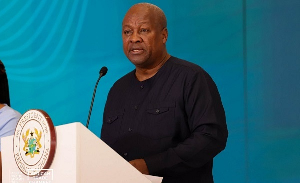The numbers are stunning and heart wrenching: according to Dr. Peter Quartey, a research fellow at the Institute of Statistical, Social and Economic Research in Accra, 78 percent of northerners...residents of the Upper West, Upper East and Northern regions...are either poor or very poor, and 38 percent of the area's inhabitants spend over 15 minutes accessing drinking water.
Dr.Quartey's forceful and honest assessment in Accra at a recent analysis of the World Development Report 2006 Equity and Development, is a subtle indictment of the anti-poverty programs launched by past administrations and the NPP. It also raises doubts about the government's firm commitment to alleviating a problem that continues to bedevil millions in the nation's largest regions.
Without holding his fire, Dr. Quartey lashed out at Ghana's entrenched and inept bureaucracy and its weak institutions for the burgeoning economic gap between the north and the south. "This perpetuates inequality; weak institutions are due to unnecessary bureaucracy-sometimes due to conscious attempts to create power, wealth and subjugation in society," Quartey said. I couldn't agree more.
What is undeniable is the fact that the crippling poverty in the north...a national tragedy if there ever was one...has been harped on for years by poverty experts, journalists and community activists. Dr. Quartey is the latest voice to join the chorus calling for an all out frontal attack on the issue.
Much of the north's rapid descent into poverty can be traced to the systemic phasing out and eventual shuttering of once vibrant industries in the 1980s and 1990s.
Northerners watched with dismay and anxiety as the blue color industries that employed large pools of able-bodied young men and women slowly withered and "died," without nary a concern from Accra. The ability to generate wealth and create long term prosperity was thus abruptly yanked away.
As for large scale commercial farming which was amply encouraged and swarmed with incentives by the late General Kutu Acheampong in the 1970s, it has simply fallen off the radar screen. Much of the food production in the northern regions has invariably fallen on the shoulders of the brave and proud subsistence farmer.
In the vacuum created, private industries, poorly organized, financially strapped of cash and with little or no incentive from the government, could not pick the up slack. They lacked the capacity to create many good and well-paying jobs.
So began the mass migration of the youth to the urban centers of Accra and Kumasi where they have morphed into the visible symbols of northern poverty.The next time you go to Makola or Asafo markets, take a good look at the young lady precariously dangling a heavy load on her head in the scorching heat, and you will understand gravity of the problem.
One would expect that confronted with this irrefutable evidence of failure of its anti-poverty initiatives, officialdom would gear up and prescribe solutions. Well, don't hold your breath.
Truth be told, the large scale destitution so prevalent in the three northern regions receives scant attention in Accra. Evidence? At Dr. Quartey's presentation, the government was represented by a low level official from the Ministry of Water Resources, Works and Housing
The excuses mouthed by government officials for the yawning chasm is the standard refrain often mouthed by starched bureaucrats. "We are doing the best we can." Or, "The ethnic violence is preventing us from doing anything concrete."
Tell that to the young school girl who gets up in the wee hours of the morning to trudge a few miles in search of water before heading off to school already burdened by hunger and fatigue.
If I may ask: has it ever occurred to the policy wonks in Accra that moving people out of poverty in the regions would greatly minimize the violence? If people have something positive to look forward to, they won't squander precious time hitting each other over the head with cudgels.
Granted that poverty in the north is an age-old issue, the NPP is in the saddle now, and people expect results.
Dr. Quartey appealed to the government to develop more coherent poverty reduction initiatives. So true. It should start with the revitalization of the shuttered industries, establishing trade schools, and returning large commercial farming to its once lucrative and prestigious status.















